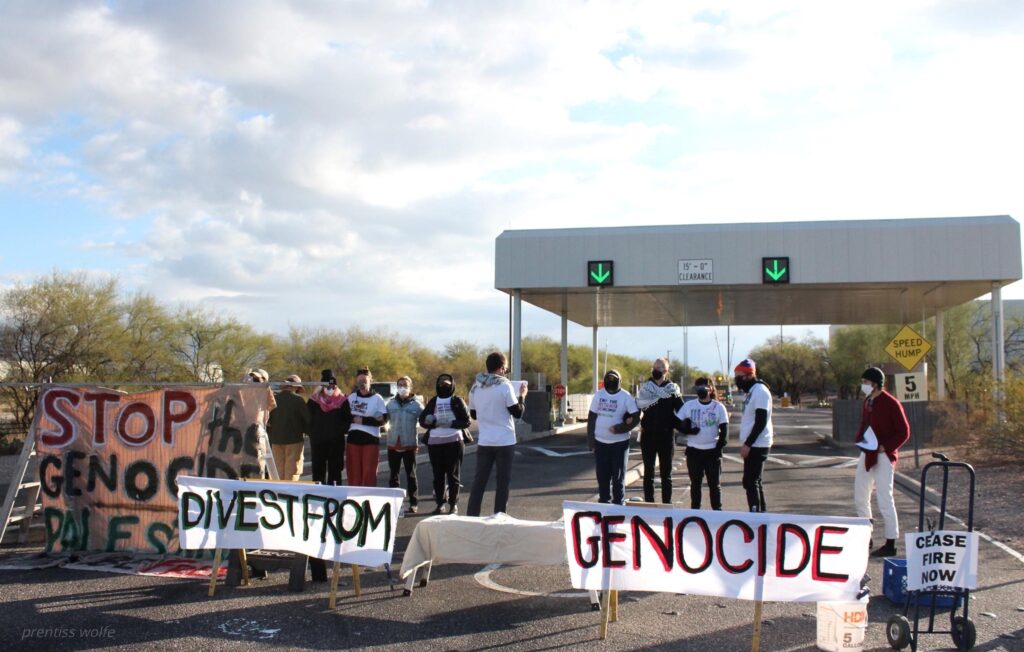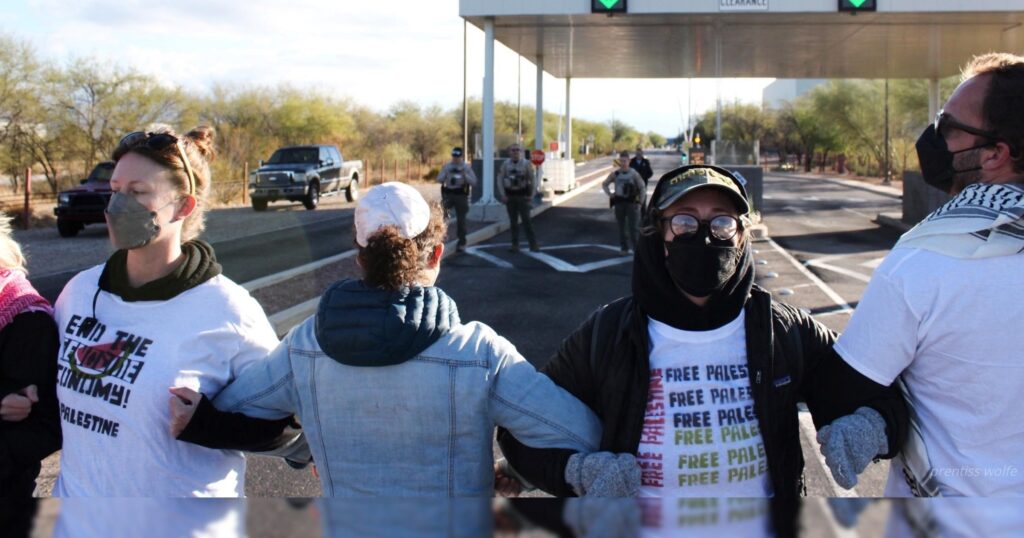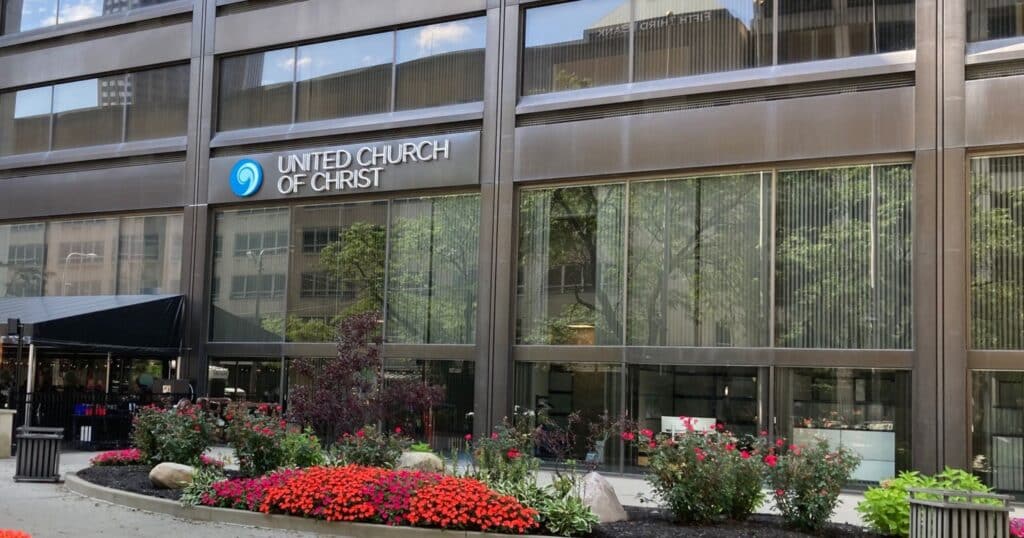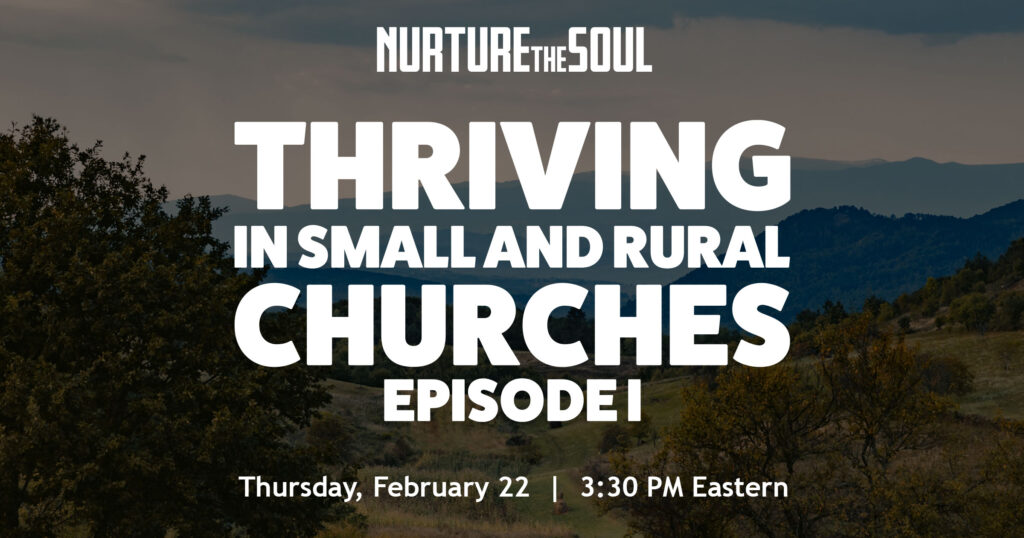UCC economic justice minister among those arrested at Arizona protest to ‘end the genocide economy’
Over 100 protesters gathered outside of the University of Arizona Tech Park in Tucson, Arizona, the morning of Nov. 30, wearing shirts with messages to “End the genocide economy” and “Free Palestine.”
Several in attendance gathered in the road leading chants, singing songs, reading poems and forming a barrier in roadways leading into the facility that is home to weapons manufacturer Raytheon. Twenty-six people were eventually arrested in the effort organized by Tucson Coalition for Palestine. Attention to the protest grew nationwide when police arrested a clearly identified reporter for KJZZ, an NPR radio station in Phoenix. Her charges have since been dropped.
United Church of Christ Minister for Economic Justice Seth Wispelwey has among those arrested and has been instrumental in forming and organizing the Tucson coalition in response to Israel’s ongoing violence against Palestinian civilians following the Hamas attack on Oct. 7. The known death toll of Palestinians in Gaza has reached over 27,000, with 85% of the population displaced and a quarter of Gaza’s residents experiencing starvation.
“Doing whatever we can to stop the ongoing genocide and ethnic cleansing of Palestinians is intimately connected to the pursuit of economic justice,” Wispelwey said. “The United States, which holds tremendous influence over Israel, funnels billions in money and weapons to them annually, and our elected leaders have only amplified their blessing and investment for this current four-month-long slaughter. This is grotesque and abominable on its face, particularly for people of faith and conscience who profess a still-speaking God is alive to liberation and peace in our world.”
Condemning tax dollars for war
Raytheon is the second-largest military company in the United States, with a yearly revenue of over $67 billion, and is Tucson’s largest employer. Its missiles, bombs and weapon systems are used by the Israeli military against Palestinian civilians, according to a report of the American Friends Service Committee, and its development of weapons technologies have been intimately connected with the University of Arizona.
The Tucson Coalition for Palestine has organized several actions and disruptions in response, including a “die-in” at a different Raytheon facility earlier in November.
Tali Ginsburg, one of those arrested during the Nov. 30 protest, described being “extremely cognizant of the fact that the place I live is an epicenter of a genocide economy and a war economy,” according to a news report.
“Actions like this tell a story with several key plot points,” Wispelwey said. “We are saying with our bodies and voices where they cannot be ignored: we are the local community; we pay taxes that fund both Raytheon and the university; we condemn the uses of our money for genocide and war; we are willing to risk arrest and even jail time because lives are literally on the line; and every cent blocked or redirected from death is a cent that matters if it means even one less dead child murdered by a missile branded ‘Made in the U.S.A.’”
Those arrested during the Nov. 30 action were charged with criminal trespassing, and they are due back in court in mid-February.

A national movement
Protests and disruptive actions against weapons manufacturers have taken place throughout the country where people have gathered with goals of protesting and, in some cases, blocking the direct movement of weapons and war products to Israel.
Just in November, demonstrators blockaded another Raytheon facility in Southern California; hundreds gathered at the port of Tacoma, Washington, to block a military supply ship; hundreds more rallied in San Diego in protest at the offices of defense contractor Northrop Grumman; around 150 gathered outside Boeing in St. Louis to demand the company stop manufacturing bombs and warplanes used by the Israeli military; crowds gathered in Boca Raton, Florida, to protest Real-Time Laboratories, a subsidiary of Elbit Systems and major weapons supplier for Israel; and protesters locked themselves to a U.S. military supply ship to prevent it from leaving Oakland’s port.
Global Ministries — the common witness of the UCC and Christian Church (Disciples of Christ) — recently joined 25 faith-based and human rights organizations in sending a letter to voice concerns to Secretary of State Antony Blinken and Secretary of Commerce Gina Raimondo about “the massive numbers of small arms that the U.S. is exporting to Israel, and the violence and human rights violations that have and will continue to occur as a result.” The letter urges a suspension of all firearms exports to Israel and implementation of strong firearms export controls globally.
Wispelwey describes how weapons manufacturers make “extreme profits” by contracting with the U.S. government. “These U.S. corporations make and supply settler-colonial apartheid states like Israel with weapons and technology to carry out mass murder,” he said. The annual U.S. military budget is nearing a trillion dollars, he said, while recent reports show housing is now unaffordable for half of all renters in the United States.
“This is being done with our tax dollars. This is our money being used to propagate death and destruction against an already oppressed people. These billions could be used to manifest human rights like housing and health care, and alleviate the struggle of millions burdened by debt, hunger and more. When we all can thrive, we all thrive. Instead, our national priorities for spending are unsustainably weighted towards killing and war,” he said.
‘It matters when we show up’
Wispelwey said that the Tucson Coalition for Palestine has a primary objective to bring attention to, and disrupt, the war and genocide economy. They are aiming to grow a community based in mutual care and collaboration while participating in public events and actions, including organizers and participants who represent diverse backgrounds and religious traditions.
“As a Kohenet, a Jewish clergyperson, in the lineage of my partisan, diasporic and land-rooted ancestors of blood and tradition, it is clear to me that more destruction only brings all of us into more separation, isolation, fear and contraction,” said Molly Block, who is part of the coalition. “Tucson Coalition for Palestine is just one expression of the vision of a new world. Rooted in care and communication, and outwardly expressed through action, we know that being a part of a vast web is what brings us safety, not the war economy.”
“I was arrested because I believe these cries I hear — that millions are hearing worldwide right now who witness the countless atrocities on our timelines — and because as bleak as things have been since October, I know that it matters when we show up and embody solidarity,” Wispelwey said. “The living God cries out through scripture, prophets and history for just and life-giving use of money, relief of debts and for swords to be beaten into plowshares. Jesus weeps in anger, frustration and sadness at what is being done right now, and which we are all a party to.”
Wispelwey invites others to get involved in the urgency of the current movement for solidarity.
“Let us fill the ‘J.A.R.’ of God’s economic justice instead of war and death — jubilee, abundance and reparations are the only way forward if our children, and the surviving Palestinian children, are to have a world worth inheriting,” he said.
Content on ucc.org is copyrighted by the National Setting of the United Church of Christ and may be only shared according to the guidelines outlined here.
Related News
UCC economic justice minister among those arrested at Arizona protest to ‘end the genocide economy’
Over 100 protesters gathered outside of the University of Arizona Tech Park in Tucson,...
Read More‘The consistent theme is love’: In new year, UCC National Setting builds on ‘one-staff model’
As the calendar turned to 2024, the United Church of Christ national ministry teams began...
Read MoreJoin February webinar series for discussion of thriving churches in rural and small towns
A recent United Church of Christ survey found that over 60% of UCC congregations have small...
Read More

